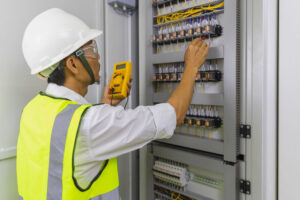Embarking on a new construction project is an exciting endeavor that requires careful planning and coordination across various trades. One essential aspect of any construction project is electrical services. From designing the electrical system to installing fixtures and ensuring compliance with regulations, electrical contractors play a vital role in bringing a new building to life.

Pre-Construction Planning
Before construction begins, electrical contractors collaborate with architects, engineers, and builders to develop a comprehensive electrical plan. This stage involves evaluating the project’s electrical needs, load calculations, and determining the placement of outlets, lighting fixtures, and switches.
A thorough understanding of the building’s functionality, code requirements, and energy efficiency goals is crucial during this phase. The electrical plan serves as a blueprint for the entire project, ensuring a smooth and efficient installation process.
Electrical System Installation
Once the construction phase begins, electrical contractors execute the electrical plan by installing the building’s electrical system. This includes laying the necessary wiring, conduits, and cables, and installing switchboards, circuit breakers, and distribution panels. In collaboration with other trades, electrical contractors coordinate the installation of electrical infrastructure alongside plumbing, HVAC, and structural components. Strict adherence to safety standards and building codes is essential to ensure a safe and reliable electrical system.
Lighting and Fixture Installation
Proper lighting design is critical for creating a functional and aesthetically pleasing environment in any building. Electrical contractors work closely with designers and architects to install lighting fixtures, ensuring appropriate placement, functionality, and energy efficiency. This involves installing recessed lighting, pendant lights, track lighting, and other fixtures according to the project’s specifications. Additionally, wiring and controls for dimming systems, occupancy sensors, and daylight harvesting may be incorporated to maximize energy savings.
Power Outlets and Specialty Circuits
Electrical contractors are responsible for installing power outlets and specialty circuits throughout the building. This includes receptacles for general use, dedicated circuits for appliances, outlets in kitchen and bathroom areas, and electrical connections for specialized equipment or systems. They ensure proper grounding, sufficient power capacity, and compliance with electrical codes and safety regulations. Well-planned and strategically located power outlets contribute to the convenience and functionality of the building.
Testing and Inspection
Once the electrical system installation is complete, electrical contractors perform thorough testing and inspections to ensure everything functions as intended. This includes conducting voltage and load testing, verifying circuit integrity, and checking the functionality of switches, outlets, and lighting fixtures. Inspections by relevant authorities and building code compliance officials may also be carried out during this stage. Any necessary adjustments or corrections are made to ensure the electrical system meets safety and performance standards.
Contact Hayes & Lunsford Electric at (864) 297-3198 (SC) or (828) 412-5852 (NC) or visit us online for more information!

